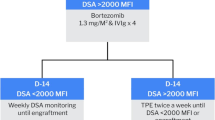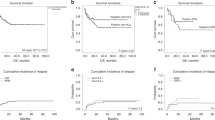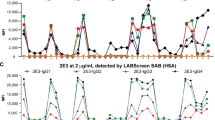Abstract
Pre-existing donor-specific HLA antibodies in patients undergoing HLA-mismatched SCT have increasingly been recognized as a risk factor for primary graft failure. However, the clinical implications of the presence of HLA antibodies in donors remain unknown. We prospectively examined 123 related donors for the presence of HLA antibodies by using a Luminex-based single antigen assay. Of these, 1/57 (1.8%) male, 6/27 (22%) parous female and 0/39 (0%) nonparous female donors were HLA antibody-positive. Then, we determined the presence of HLA antibodies in seven patients who received SCT from antibody-positive donors. Of these, four became HLA antibody-positive after SCT. The specificities of the antibodies that emerged in the patients closely resembled those of the antibodies found in the donors, indicating their production by donor-derived plasma cells. Moreover, the kinetics of the HLA antibody levels were similar in all four patients: levels started increasing within 1 week after SCT and peaked at days 10–21, followed by a gradual decrease. These results suggest that donor-derived HLA antibody production frequently occurs in patients undergoing SCT from antibody-positive donors. Further studies are warranted for clarifying the clinical significance of donor-derived HLA antibodies, including the role of these antibodies in post transplant platelet transfusion refractoriness.
This is a preview of subscription content, access via your institution
Access options
Subscribe to this journal
Receive 12 print issues and online access
$259.00 per year
only $21.58 per issue
Buy this article
- Purchase on Springer Link
- Instant access to full article PDF
Prices may be subject to local taxes which are calculated during checkout


Similar content being viewed by others
References
Yoshihara S, Taniguchi K, Ogawa H, Saji H . The role of HLA antibodies in allogeneic SCT: is the ‘type-and-screen’ strategy necessary not only for blood type but also for HLA? Bone Marrow Transplant (e-pub ahead of print 9 January 2012; doi:10.1038/bmt.2011.249).
Spellman S, Bray R, Rosen-Bronson S, Haagenson M, Klein J, Flesch S et al. The detection of donor-directed, HLA-specific alloantibodies in recipients of unrelated hematopoietic cell transplantation is predictive of graft failure. Blood 2010; 115: 2704–2708.
Ciurea SO, Thall PF, Wang X, Wang SA, Hu Y, Cano P et al. Donor-specific anti-HLA Abs and graft failure in matched unrelated donor hematopoietic stem cell transplantation. Blood 2011; 118: 5957–5964.
Takanashi M, Atsuta Y, Fujiwara K, Kodo H, Kai S, Sato H et al. The impact of anti-HLA antibodies on unrelated cord blood transplantations. Blood 2010; 116: 2839–2846.
Cutler C, Kim HT, Sun L, Sese D, Glotzbecker B, Armand P et al. Donor-specific anti-HLA antibodies predict outcome in double umbilical cord blood transplantation. Blood 2011; 118: 6691–6697.
Ciurea SO, de Lima M, Cano P, Korbling M, Giralt S, Shpall EJ et al. High risk of graft failure in patients with anti-HLA antibodies undergoing haploidentical stem-cell transplantation. Transplantation 2009; 88: 1019–1024.
Yoshihara S, Maruya E, Taniguchi K, Kaida K, Kato R, Inoue T et al. Risk and prevention of graft failure in patients with preexisting donor-specific HLA antibodies undergoing unmanipulated haploidentical SCT. Bone Marrow Transplant 2012; 47: 508–515).
Triulzi DJ, Kleinman S, Kakaiya RM, Busch MP, Norris PJ, Steele WR et al. The effect of previous pregnancy and transfusion on HLA alloimmunization in blood donors: implications for a transfusion-related acute lung injury risk reduction strategy. Transfusion 2009; 49: 1825–1835.
Hows J, Beddow K, Gordon-Smith E, Branch DR, Spruce W, Sniecinski I et al. Donor-derived red blood cell antibodies and immune hemolysis after allogeneic bone marrow transplantation. Blood 1986; 67: 177–181.
Toren A, Dacosta Y, Manny N, Varadi G, Or R, Nagler A . Passenger B-lymphocyte-induced severe hemolytic disease after allogeneic peripheral blood stem cell transplantation. Blood 1996; 87: 843–844.
Lee HJ, Gulbis A, De Padua Silva L, Hosing C, Khouri I, de Lima M et al. Rituximab for passenger lymphocyte syndrome associated with allogeneic SCT. Bone Marrow Transplant 2008; 42: 67–69.
Adams BR, Miller AN, Costa LJ . Self-limited hemolysis due to anti-D passenger lymphocyte syndrome in allogeneic hematopoietic stem cell transplantation. Bone Marrow Transplant 2010; 45: 772–773.
Ogawa H, Ikegame K, Yoshihara S, Kawakami M, Fujioka T, Masuda T et al. Unmanipulated HLA 2–3 antigen-mismatched (haploidentical) stem cell transplantation using nonmyeloablative conditioning. Biol Blood Marrow Transplant 2006; 12: 1073–1084.
Ogawa H, Ikegame K, Kaida K, Yoshihara S, Fujioka T, Taniguchi Y et al. Unmanipulated HLA 2–3 antigen-mismatched (haploidentical) bone marrow transplantation using only pharmacological GVHD prophylaxis. Exp Hematol 2008; 36: 1–8.
Morales-Buenrostro LE, Terasaki PI, Marino-Vazquez LA, Lee JH, El-Awar N, Alberu J . Natural human leukocyte antigen antibodies found in nonalloimmunized healthy males. Transplantation 2008; 86: 1111–1115.
El-Awar N, Terasaki PI, Nguyen A, Sasaki N, Morales-Buenrostro LE, Saji H et al. Epitopes of human leukocyte antigen class I antibodies found in sera of normal healthy males and cord blood. Hum Immunol 2009; 70: 844–853.
Cai J, Terasaki PI, Anderson N, Lachmann N, Schonemann C . Intact HLA not beta2m-free heavy chain-specific HLA class I antibodies are predictive of graft failure. Transplantation 2009; 88: 226–230.
Rodey GE, Neylan JF, Whelchel JD, Revels KW, Bray RA . Epitope specificity of HLA class I alloantibodies. I. Frequency analysis of antibodies to private versus public specificities in potential transplant recipients. Hum Immunol 1994; 39: 272–280.
Roddy M, Clemente M, Poggio ED, Bukowski R, Thakkar S, Waxenecker G et al. Heterogeneous alterations in human alloimmunity associated with immunization. Transplantation 2005; 80: 297–302.
Alberu J, Morales-Buenrostro LE, de Leo C, Vargas-Rojas MI, Marino-Vazquez LA, Crispin JC . A non-allogeneic stimulus triggers the production of de novo HLA antibodies in healthy adults. Transpl Immunol 2007; 18: 166–171.
Lapierre V, Auperin A, Tayebi H, Chabod J, Saas P, Michalet M et al. Increased presence of anti-HLA antibodies early after allogeneic granulocyte colony-stimulating factor-mobilized peripheral blood hematopoietic stem cell transplantation compared with bone marrow transplantation. Blood 2002; 100: 1484–1489.
Zachary AA, Leffell MS . Detecting and monitoring human leukocyte antigen-specific antibodies. Hum Immunol 2008; 69: 591–604.
Hatakeyama N, Hori T, Yamamoto M, Inazawa N, Iesato K, Miyazaki T et al. Platelet transfusion refractoriness attributable to HLA antibodies produced by donor-derived cells after allogeneic bone marrow transplantation from one HLA-antigen-mismatched mother. Pediatr Transplant 2011; 15: E177–E182.
Nakazawa Y, Saito S, Hasegawa Y, Yanagisawa R, Sakashita K, Kamijo T et al. A possible role for the production of multiple HLA antibodies in fatal platelet transfusion refractoriness after peripheral blood progenitor cell transplantation from the mother in a patient with relapsed leukemia. Transfusion 2007; 47: 326–334.
Stegall MD, Dean PG, Gloor J . Mechanisms of alloantibody production in sensitized renal allograft recipients. Am J Transplant 2009; 9: 998–1005.
Burns JM, Cornell LD, Perry DK, Pollinger HS, Gloor JM, Kremers WK et al. Alloantibody levels and acute humoral rejection early after positive crossmatch kidney transplantation. Am J Transplant 2008; 8: 2684–2694.
Han M, Rogers JA, Lavingia B, Stastny P . Peripheral blood B cells producing donor-specific HLA antibodies in vitro. Hum Immunol 2009; 70: 29–34.
Miklos DB, Kim HT, Zorn E, Hochberg EP, Guo L, Mattes-Ritz A et al. Antibody response to DBY minor histocompatibility antigen is induced after allogeneic stem cell transplantation and in healthy female donors. Blood 2004; 103: 353–359.
Miklos DB, Kim HT, Miller KH, Guo L, Zorn E, Lee SJ et al. Antibody responses to H–Y minor histocompatibility antigens correlate with chronic graft-versus-host disease and disease remission. Blood 2005; 105: 2973–2978.
Small TN, Robinson WH, Miklos DB . B cells and transplantation: an educational resource. Biol Blood Marrow Transplant 2009; 15 (Suppl): 104–113.
Acknowledgements
We thank the medical, nursing and laboratory staff of the participating departments for their contribution to this study. We are also grateful to Ms Aya Yano and Ms Kimiko Yamamoto for their technical assistance and to Mr Shigeo Kimura, Ms Kazuko Saida and Ms Kumiko Sugawara for their assistance with data collection.
Author information
Authors and Affiliations
Corresponding author
Ethics declarations
Competing interests
The authors declare no conflict of interest.
Rights and permissions
About this article
Cite this article
Taniguchi, K., Yoshihara, S., Maruya, E. et al. Donor-derived HLA antibody production in patients undergoing SCT from HLA antibody-positive donors. Bone Marrow Transplant 47, 1338–1342 (2012). https://doi.org/10.1038/bmt.2012.28
Received:
Revised:
Accepted:
Published:
Issue Date:
DOI: https://doi.org/10.1038/bmt.2012.28



